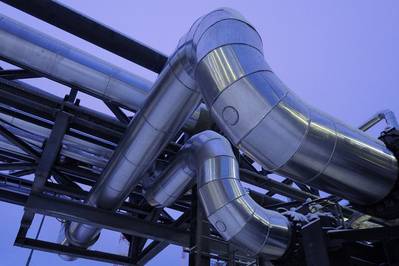EU Struggles to Unpick the Knot of Russia-Ukraine Gas Logistics
Unprecedented talks across the European Union on Tuesday showed it scrambling for solutions on the ground to break its dependence on Russian gas and help supply Ukraine.
The EU faces a daunting task in quickly overcoming a mountain of logistical challenges, avoiding breaking binding contracts and making sure Ukraine does pay up for gas.
Russia supplies 30 percent of Europe's gas needs. It has threatened to cut off supplies to Ukraine because of debts reviving fears of a repeat of supply crises across Europe of 2007 and 2009.
Offering some relief for Ukraine, Germany's RWE began deliveries of natural gas on Tuesday, marking an initial step in EU efforts to boost supplies to Kiev.
Sending gas to Ukraine from the EU is a powerful weapon. The Russian state gas export monopoly Gazprom has long protested against the scheme, saying it feared its gas destined for Germany would be re-exported to Ukraine in breach of contracts.
RWE said it is a mixture of gas supplies from many sources, and Ukraine could get as much as 10 billion cubic metres (bcm) of gas per year under a framework 2012 agreement.
That would be a big boost to Kiev - allowing it to cut Russian gas imports by a third - especially after Moscow nearly doubled the gas price it charges Ukraine, tearing up a discount agreed with the previous pro-Moscow president.
The problem would be to deliver the gas to Ukraine, which has annual gas consumption of 55 bcm.
Polish pipeline operator Gaz-System said it could deliver 1.5 bcm annually, Hungary can probably send another 3.5 bcm to Ukraine, while Romania has the potential to send 1.8 bcm, but there has been no firm agreement on its deliveries.
Slovakia is the EU's best-placed member to pump gas to Ukraine but reversing flows along any of the four pipelines that take Russian gas to it via Ukraine would require an agreement that doing so does not violate current contracts with Gazprom.
Slovakia and Ukraine failed to reach an agreement on Tuesday on reversing the flows, Slovak Economy Minister Tomas Malatinsky said.
Instead the two sides are considering signing a memorandum later in April on a proposal to reopen a disused pipeline to take some gas out of a main East-West line, on the Slovak side of the border, and loop it back into Ukraine.
The link could supply more than 3 bcm annually to Ukraine from October, rising to around 9 bcm by next spring.
"The memorandum which is prepared is a certain step toward reverse supplies from the European Union, but I am saying openly that given the situation - a very exceptional situation - we would need substantially more," Ukrainian Energy Minister Yuri Prodan told reporters.
South Stream
While reverse flows would help cushion the effects of a Russian export cut during mild-demand summer months, analysts say they would not be sufficient in winter.
Some countries in Europe are even more reliant on Russian gas than Ukraine, including Bulgaria, where the energy minister said on Tuesday he had discussed importing gas from Azerbaijan should Russia cut off supplies.
"We are carefully monitoring the situation in Ukraine. We discussed short-term actions so that we can guarantee gas supplies," Dragomir Stoynev told reporters after meeting Azeri counterpart Natik Aliyev.
Aliyev said the pair discussed delivery of liquefied natural gas (LNGLF) (LNG) to Greek ports and from there to Bulgaria.
Neither Azerbaijan nor Greece have the LNG terminals to provide such cargoes at the moment.
Russia pressed ahead with its South Stream natural gas link to Europe which aims to bypass Ukraine and help Moscow increase its share of the continent's supply, especially in southern Europe.
Following previous gas rows with Kiev, Russia has invested billions of dollars in new pipelines, including Nord Stream, which brings additional gas to Germany bypassing Ukraine.
South Stream is planned to pump gas into Bulgaria and from there further into the EU by the end of the decade.
Gazprom's partner in the project, Italy's Eni, has said the future of South Stream has been put in question by the escalating dispute over Ukraine. The EU has also postponed clearing the project.
Despite the crisis in relations, the consortium running the South Stream project said it would start laying the first stretch of pipes this autumn.
(By Jan Lopatka and Christoph Steitz; Reporting by Vladimir Soldatkin in Moscow, Jan Lopatka in Velke Kapusany, Christoph Steitz in Frankfurt, Michael Kahn in Warsaw and Tsvetelia Tsolova in Sofia, writing by Alexander Winning and Dmitry Zhdannikov; Editing by Henning Gloystein and William Hardy)









